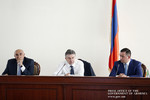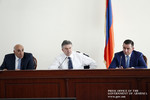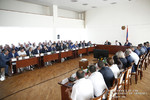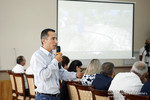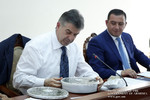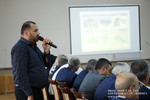Saturday, 26 August 2017
Community budget planning process to come under strict control from 2018 - PM holds consultation in Gegharkunik Marz
The Prime Minister-chaired consultation in Gavar town of Gegharkunik Marz discussed the status of Marz and community development programs, the work done so far and future action,
Reporting on the socio-economic situation and macroeconomic indicators of his Marz, Governor Karen Botoyan noted that the share of Gegharkunik in the total GDP of the country is 5 percent, the per-capita gross domestic product – 1 million 64 thousand 900 drams. The total volume of industrial production amounted to AMD31, 728.800 billion and AMD136, 900 thousand in per-capita estimate. Mining is the region’s staple industry.
According to Karen Botoyan, agriculture is one of the priorities for development of the region. In 2016, the gross agricultural output amounted to AMD 153 billion, with nearly 660.100 thousand drams of per capita income.
As a result of the joint efforts of the Ministry of Territorial Administration and Development and the Marz administration, 9 investment programs were submitted to the Government of Armenia to a total cost of AMD 2,056.600. The Government has approved 6 of these programs. 33 investment projects were submitted to the Ministry of Territorial Administration and Development, the Ministry of Economic Development and Investments and Hayastan All-Armenian Fund, which are currently under discussion. Karen Botoyan assured that jobs are the center of the local authorities’ attention.
The Governor emphasized that tourism is one of the priorities of the region’s development. Taking into account the fact that regional tourism flows are seasonal, as a result of which the activity is experiencing a significant decline especially in the winter months, it seems expedient to create zones of winter rest, as well as provide the Sevan basin with an extensive network of well-known cafes and recreational facilities.
Karen Botoyan reported that with the exception of the Artsvashen community of the province, the community councils have approved community development programs. All communities have electronic passports. He also reported that no serious problems have been spotted on the eve of the 2017-2018 academic year. More than 27,800 schoolchildren will be hosted in the region’s secondary educational institutions alone.
In 91 communities of Gegharkunik Marz, the level of own revenue collection stood at 88 percent over the 7 months of this year. The annual target was met by 44.7 percent. The performance is 12.8 percent more than in the same period last year.
Touching upon the own revenue collection rates, Prime Minister Karapetyan noted that Gegharkunik Marz has the lowest level in this respect and underlined that there is a problem of collection discipline. The Head of Government underlined that the expected growth of own revenue is only 9% for 2017 in Gegharkunik Marz, while this figure varies between 15-20% in other provinces.
“All community leaders should know clearly that against the background of 100 percent State budget revenue collection and planned allocations to communities, it would be unacceptable if they could decide which way to collect and spend them,” Karen Karapetyan said. The Premier underscored that starting from 2018 the community budget planning process will be under strict control.
“We want to create equal partnerships. We respect the rights of community leaders, but that does not mean that they should operate under a different regime in their communities, because we form the State budget revenue by working with just the same citizens as the community heads,” the Head of Government pointed out.
The Prime Minister was next briefed on the situation in the fields of agriculture, healthcare, education, garbage disposal in Gegharkunik Marz and the work on dealing with the existing problems. In particular, information was provided about the establishment of intensive gardens, improvement of tourism infrastructures, ongoing activities and optimization of educational and healthcare systems.
The supervisor of the agricultural sector noted that the gross agricultural output in the region amounted to 153 billion drams in 2016, with 63,000 farms operational in this area. There are several successful farms with drip irrigation systems in the region; another such farm has recently been founded in Shorzha community. It continues to expand, as a result of which we will have apricot harvest in the month of October within the nest few years.
Welcoming the implementation of programs like that, Karen Karapetyan emphasized the importance of continued submission of agricultural projects to the Government on subsidized agricultural machinery, introduction of drip irrigation systems, establishment of intensive gardens and installation of hail-proof networks. The Prime Minister said to be convinced that these programs will change the quality of life in the countryside.
Touching upon waste management issues, the responsible officials reported that garbage contracts had been signed with only 800 out of 5,800 legal entities in the province, which the Prime Minister considered unacceptable.
The Premier emphasized that the communities should reconsider the policy of garbage disposal and urged them to complete the contracting process within a short period of time. Karen Karapetyan also noted that Gegharkunik’s index is the lowest as compared to the national average.
Prime Minister Karen Karapetyan next discussed the ongoing activities with the local education and healthcare officials. The Head of Government spoke about the rationale behind the initiated reforms, suggesting further steps with the relevant departments.
The meeting next focused the programs implemented in Kalavan and Vardenik communities. In particular, taking into account the competitive edge of Kalavan, extreme and archeological tourism facilities and organic agriculture development programs have been implemented in the community. As a result, the number of tourists visiting the community reached 10,000. A 10-year community development program has been developed.
The Mountain Goods program has been implemented in Vardenik community, under which the locals collected and marketed different kinds of fruit and vegetables from the mountains. As a result, 65 families were provided with jobs. It was noted that dried and frozen vegetables had been sold out. 13 million drams is needed to expand the program.
Karen Karapetyan instructed the heads of respective department to provide the necessary assistance to the aforementioned programs, urging them to present these successful projects to other communities.







